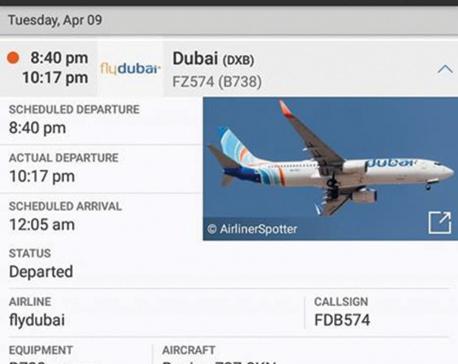
OR
#Editorial
Feather Ruffling: FlyDubai Engine Fire Incident
Published On: April 26, 2023 07:00 AM NPT By: Republica | @RepublicaNepal

On Monday night, a Fly Dubai flight from Kathmandu to Dubai experienced an engine fire shortly after takeoff. The airline claimed that it was due to a bird strike. But the Civil Aviation Authority of Nepal (CAAN), the regulator of Nepal’s aviation industry, denied this claim based on the conversation between the aircraft's captain and the air traffic controllers at the Tribhuvan International Airport (TIA). Subsequently, the CAAN took action against two FlyDubai officials for spreading rumors, while the airline faced criticism for potentially compromising the safety of the flight by continuing to fly to its destination.
The most important thing here is instead of returning to the airport of takeoff as per standard operating procedures, the flight continued its onward journey to Dubai. This decision by the airline has sparked a controversy, with contradicting claims between the airline and the CAAN, which has accused FlyDubai of spreading rumors about a bird-hit incident that did not occur. This controversy raises serious concerns about safety, accountability, and the responsibility of airlines in such situations.
FlyDubai, a budget carrier based in the United Arab Emirates (UAE), has stated that its experienced flight crew followed standard operating procedures and determined that the engine was within normal operating parameters, allowing the flight to continue to its destination. However, CAAN has denied the claim of a bird-hit incident and has accused FlyDubai of spreading rumors. According to CAAN, the pilot informed the ATC that there was a problem with the engine which had caught fire, and initial information from CAAN suggested that the air flow was not enough, but the airline claimed it was a bird-hit. CAAN has taken action against two FlyDubai managers, banning them from entering the TIA.
The transparency and accuracy of information provided by airlines in the event of an aviation incident are of utmost importance. Airlines have a responsibility to provide accurate and timely information to the public, regulators, and other stakeholders in order to ensure transparency and maintain trust in the aviation industry. In this case, FlyDubai's initial claim of a bird strike, which was later convincingly denied by the CAAN, raises questions about the airline's commitment to transparency and accountability. Providing inaccurate information can create confusion and panic among passengers and the public, and can also hinder the investigation and resolution of aviation incidents.
Furthermore, the decision of FlyDubai to continue flying to its destination despite the engine fire raises concerns about the safety of the flight and the decision-making process of the airline. According to the rules of the International Civil Aviation Organization, it is up to the captain-in-command to make the final decision in such situations - whether to return to the airport of takeoff or continue flying to the destination. However, in this case, some may argue that it would have been safer to return to the TIA considering the engine fire and the potential risks involved. FlyDubai's decision to continue flying to its destination, based on the determination that the engine was within normal operating parameters, has been met with criticism and has raised questions about the airline's commitment to passenger safety.
The incident also brings to light the importance of accountability and consequences for airlines and their employees in the event of aviation incidents. The CAAN’s action against two FlyDubai officials sends a strong message that spreading inaccurate information and creating confusion in the aviation industry will not be tolerated. Airlines and their employees must be held accountable for their actions and should face appropriate consequences for any breaches of aviation regulations or procedures that compromise safety.
In addition, this incident highlights the need for collaboration and coordination between airlines, regulators, and other stakeholders in the aviation industry. In this case, the conflicting claims made by FlyDubai and the CAAN have resulted in confusion and controversy, which could have been avoided through better communication and coordination. It is important for airlines and regulators to work together in a transparent and collaborative manner in the event of aviation incidents, to ensure that accurate information is provided.
The incident also highlights the need for thorough investigations and accountability in the aviation industry. CAAN has taken action against two Fly Dubai managers for spreading rumors that its engine was hit by a bird. But a comprehensive investigation into the incident should be conducted to determine the root cause of the engine problem and the actions taken by the airline. This should be done in an impartial and transparent manner to ensure that the appropriate parties are held accountable for their actions or negligence, and measures are taken to prevent similar incidents in the future.
Fly Dubai has faced controversy before, with a previous incident in July 2018 where one of its pilots failed an alcohol test in Nepal before being due to operate a flight to the UAE. The incident resulted in disciplinary action against the pilot and an investigation by the UAE General Civil Aviation Authority. The safety and security of passengers should always be the top priority for airlines, and any violation of regulations or standards should be met with strict consequences to ensure accountability and prevent recurrence.
You May Like This

Chopper firms provided 5 days to relocate to new operating base for night-stop
KATHMANDU, June 23: Helicopter companies have been provided five more days to relocate to a new operating base for night-stop. Read More...

No time for NOTAM
Irrespective of the suffering caused by the cancellation of RA’s flight (RA231) to Dubai (DWC) due to night time runway... Read More...

Furnish details of outstanding dues within three days: CAAN to TIA
KATHMANDU, Nov 29: Civil Aviation Authority of Nepal (CAAN) has directed Tribhuvan International Airport (TIA) management committee to submit details of... Read More...





Just In
- EC decides to permit public vehicles to operate freely on day of by-election
- Fugitive arrested after 26 years
- Indian Potash Ltd secures contract to bring 30,000 tons of urea within 107 days
- CAN adds four players to squad for T20 series against West Indies 'A'
- ‘Precast' technology introduced in the construction of bridges along Muglin-Pokhara road
- Leopard attack injures young man in Kanchanpur
- SC rejects writ petition filed against Home Minister Lamichhane
- Nepal and China sign two agreements in the presence of Finance Minister Pun














Leave A Comment